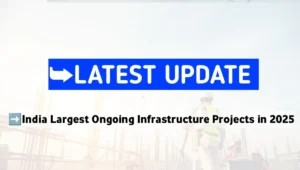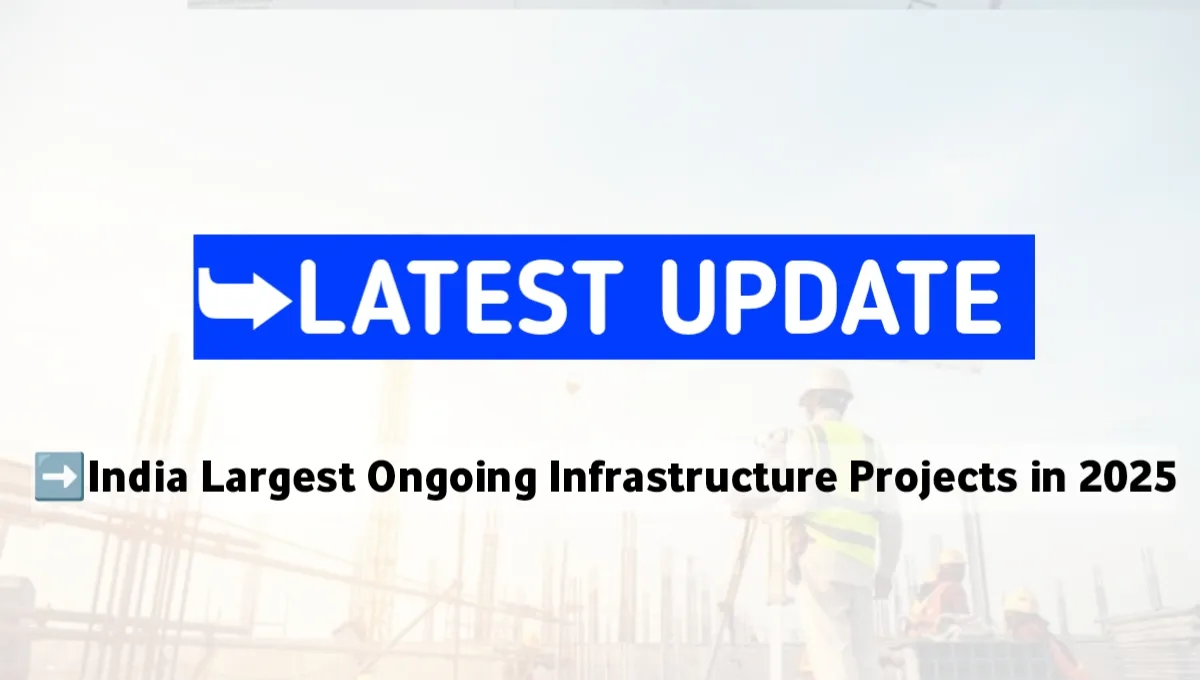India Largest Ongoing Infrastructure Projects in 2025
India’s infrastructure sector is undergoing one of its biggest growth phases in history. From mega expressways and metro networks to new airports and smart cities, 2025 is witnessing large-scale projects aimed at boosting connectivity, economic growth, and sustainability. These projects not only create thousands of jobs but also open up immense opportunities for contractors, engineers, and suppliers across the country.
In this article, we explore India’s top ongoing infrastructure projects in 2025 — their scale, purpose, investment, and expected impact.
India Largest Ongoing Infrastructure Projects in 2025
1. Delhi–Mumbai Expressway
- Type: Road Infrastructure (Expressway)
- Length: ~1,386 km
- Estimated Cost: ₹1 lakh crore+
- Completion Timeline: 2026 (Partial stretches operational in 2024–25)
The Delhi–Mumbai Expressway is India’s longest expressway under construction, connecting the national capital to the financial capital through Haryana, Rajasthan, Madhya Pradesh, Gujarat, and Maharashtra. It will reduce travel time between Delhi and Mumbai from 24 hours to just 12 hours.
Key Highlights:
- 8-lane greenfield access-controlled expressway (expandable to 12 lanes).
- Developed under the Bharatmala Pariyojana by NHAI.
- Smart traffic management systems and wayside amenities every 50 km.
- Significant employment generation for construction and allied industries.
2. Mumbai–Ahmedabad High-Speed Rail Corridor (Bullet Train Project)
- Type: Rail Infrastructure
- Length: ~508 km
- Estimated Cost: ₹1.1 lakh crore+
- Completion Timeline: 2028 (Priority sections by 2026)
India’s first bullet train project will run at speeds of up to 320 km/h, cutting travel time between Mumbai and Ahmedabad to just 2 hours. Built with Japanese Shinkansen technology, this project marks a major leap in India’s rail modernisation.
Key Highlights:
- Elevated tracks and underground tunnels, including a 21 km tunnel under the Thane Creek.
- State-of-the-art stations with multi-modal integration.
- Collaboration between National High-Speed Rail Corporation Limited (NHSRCL) and Japan International Cooperation Agency (JICA).
3. Delhi–Meerut Regional Rapid Transit System (RRTS)
- Type: Urban Transit
- Length: ~82 km
- Estimated Cost: ₹30,000 crore+
- Completion Timeline: 2025 (Sahibabad–Duhai section already operational)
The Delhi–Meerut RRTS is India’s first regional rapid transit system, designed for speeds of 160 km/h, offering a quick, comfortable, and sustainable alternative to road travel.
Key Highlights:
- Seamless travel from Delhi to Meerut in just 55 minutes.
- Air-conditioned, spacious coaches with modern facilities.
- Integrated with Delhi Metro and other public transport hubs.
4. Mumbai Coastal Road Project
- Type: Urban Road Infrastructure
- Length: ~29.2 km (Phase 1)
- Estimated Cost: ₹12,721 crore
- Completion Timeline: 2025
This ambitious project will decongest Mumbai’s western corridor by providing a seamless high-speed link between South Mumbai and the suburbs.
Key Highlights:
- Twin tunnels under Malabar Hill.
- Multiple interchanges for smooth traffic flow.
- Designed with environmental protection measures such as mangrove preservation.
5. Ganga Expressway, Uttar Pradesh
- Type: Road Infrastructure
- Length: ~594 km
- Estimated Cost: ₹36,000 crore
- Completion Timeline: 2025–26
The Ganga Expressway will connect Meerut to Prayagraj, passing through 12 districts of Uttar Pradesh, boosting trade, tourism, and regional development.
Key Highlights:
- 6-lane expandable to 8 lanes.
- Significant reduction in travel time between Eastern and Central UP.
- Integrated with industrial corridors for logistics efficiency.
6. Jewar Noida International Airport (NIA)
- Type: Airport Infrastructure
- Estimated Cost: ₹29,560 crore
- Completion Timeline: Phase 1 by 2024–25
Planned to be India’s largest airport, Jewar Airport will cater to 12 million passengers annually in its first phase. It will help decongest the Delhi IGI Airport and boost the NCR’s connectivity to the world.
Key Highlights:
- Built on 1,334 hectares.
- Greenfield airport with sustainable design and renewable energy use.
- Developed by Zurich Airport International.
7. Chenab Bridge, Jammu & Kashmir
- Type: Rail Bridge
- Height: 359 metres (world’s highest railway bridge)
- Length: 1,315 metres
- Completion Timeline: 2024–25
Part of the Udhampur–Srinagar–Baramulla Rail Link (USBRL) project, the Chenab Bridge is a marvel of engineering connecting Kashmir with the rest of India via rail.
Key Highlights:
- Higher than the Eiffel Tower.
- Designed to withstand extreme wind speeds and seismic activity.
- Enables year-round connectivity in a challenging terrain.
8. Mumbai Trans Harbour Link (MTHL)
- Type: Sea Link
- Length: 21.8 km
- Estimated Cost: ₹17,843 crore
- Completion Timeline: 2025
The MTHL will be India’s longest sea bridge, connecting Mumbai with Navi Mumbai, significantly cutting down travel time between the two.
Key Highlights:
- Six-lane road with intelligent transport systems.
- Built to international safety standards.
- Boosts connectivity to Navi Mumbai Airport.
Why These Projects Matter for India’s Growth
These mega projects are not just about infrastructure — they are about economic transformation. They:
- Reduce travel time and logistics costs.
- Generate millions of jobs in construction, engineering, and allied sectors.
- Improve trade, tourism, and regional development.
- Enhance India’s global competitiveness.
Challenges in Mega Infrastructure Projects
While the benefits are clear, large-scale projects face challenges:
- Land acquisition delays.
- Environmental clearances.
- Cost overruns due to inflation and raw material price changes.
- Coordination between multiple agencies.
- Addressing these issues quickly is essential for timely project completion.
Conclusion
2025 is a landmark year for India’s infrastructure sector, with multiple mega projects either nearing completion or progressing at record speed. These developments will reshape India’s connectivity, urbanisation, and economic growth trajectory for decades to come.
For professionals in the construction industry — from civil engineers to contractors — these projects represent immense career and business opportunities.
FAQs
Q1: Which is the largest infrastructure project in India in 2025?
A1. The Delhi–Mumbai Expressway is currently the largest ongoing infrastructure project by scale and cost.
Q2: When will the Mumbai–Ahmedabad bullet train start?
A2. Priority sections are expected to be operational by 2026, with full completion by 2028.
Q3: What is India’s tallest infrastructure in 2025?
A3. The Chenab Bridge in Jammu & Kashmir, standing at 359 metres above the riverbed.
Q4: Which is India’s largest airport under construction?
A4. Jewar Noida International Airport, planned to be the largest in terms of passenger capacity.
Q5: How do mega projects benefit the construction industry?
A5. They create demand for skilled manpower, generate contracts for contractors and suppliers, and bring technological advancements to the sector.
Follow Our Channel: Click here
Home Page: Click here

